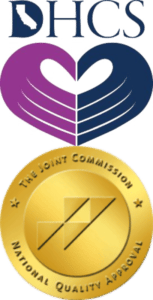What to Expect from a Drug Detox
Table of Contents
When you or a loved one is battling substance abuse, knowledge is one of your greatest allies. One common question many have is: “How long does it take to detox from drugs?” or, “What is drug detox like?” In this article, we aim to provide clear answers and help demystify the inpatient detox process for those considering it as a treatment program for addiction.

What is Drug Detox?
Drug detox, short for detoxification, is an integral and often the initial step in the journey to recovery from substance abuse or a substance use disorder. The process might seem straightforward—a way for the body to rid itself of drugs or alcohol—but in reality, it’s a multifaceted procedure that involves both physical and emotional components.
Biological Process
At its core, drug detox involves the physiological process where the body clears out the presence of drugs, metabolites, and toxins. This allows the individual’s system to return to its normal state of functioning. As the body begins to adapt to the absence of the drug, withdrawal symptoms can emerge, necessitating close monitoring.
Emotional and Psychological aspects
While the physical process is ongoing, individuals often grapple with emotional and psychological challenges. Fear, anxiety, depression, and even moments of clarity and introspection can surface. This is why detox isn’t just about treating the body but also addressing the mind and spirit. Many individuals may confront the reasons they turned to substances in the first place, making this period particularly intense.
The Importance of a Structured environment
Regardless of the chosen method, a structured environment can be beneficial. Such a setting ensures that the individual is away from potential triggers, has access to medical and emotional support, and can focus entirely on recovery.
In essence, drug detox is more than just the physical act of purifying the body from harmful substances. It’s a deeply personal journey that addresses the intertwined nature of our physical, emotional, and psychological selves. At facilities like No Matter What Recovery, the emphasis is on providing an environment and resources that cater to every aspect of this profound transformation.
Are You Ready To Get Help?
Withdrawal Symptoms
Withdrawal symptoms can range from mild discomforts, like headaches or nausea, to more severe and sometimes life-threatening conditions, like seizures or hallucinations depending on the substance. These symptoms arise because the body, over time, becomes reliant on the drug and reacts when it is no longer present.
The following list is not exhaustive, and the intensity and duration of withdrawal symptoms can vary significantly among individuals. It’s essential to consult with a healthcare professional or specialist when facing withdrawal to ensure safety and proper support.
Mood Symptoms
- Anxiety
- Depression
- Irritability
- Mood swings
- Agitation
Physical Symptoms
- Fatigue
- Muscle pain or stiffness
- Changes in appetite (increase or decrease)
- Nausea or vomiting
- Sweating or night sweats
- Rapid heart rate
- Tremors or shakiness
- Seizures
Behavioral Symptoms
- Restlessness
- Concentration problems
- Social isolation
- Strong cravings for the substance
Cognitive Symptoms
- Confusion
- Memory Problems
- Difficulty concentrating
Psychological Symptoms
- Paranoia
- Hallucinations
- Delirium
Substance-specific Symptoms
Alcohol Detox Withdrawal Symptoms
- Delirium tremens
- Seizures
- Anxiety or depression
Opioid Detox Withdrawal Symptoms
- Muscle and bone pain
- Involuntary leg movements
- Strong drug cravings
Benzodiazepine Detox Withdrawal Symptoms
- Seizures
- PsychosisCold flashes
- Anxiety or panic attacks
- Muscle pain or stiffness
Stimulant Detox Withdrawal Symptoms
- Fatigue
- Increased appetite
- Agitation or restless behavior
- Vivid and unpleasant dreams
How Long Does It Take to Detox from Drugs?
The duration of a drug detox and withdrawal timelines can vary significantly depending on several factors:
- Type of Substance: Different drugs have varied half-lives and can remain in the system for diverse durations. For instance, withdrawal from benzodiazepines differs significantly from withdrawal from opiates.
- Duration of Usage: Those who’ve been using a substance for an extended period may face a longer detox period.
- Amount Used: Higher amounts of a substance typically result in a more extended detox period.
- Individual Metabolism: Everyone’s body is unique, and how quickly you metabolize drugs can affect detox duration.
- Physical Health: Overall health, including liver and kidney function, can influence how quickly drugs are expelled from the body.
Typically, the acute phase of detox, where the most intense symptoms occur, can last anywhere from a few days to a few weeks. However, post-acute withdrawal symptoms can last for months.
What is Drug Detox Like?
Detoxing from drugs can be both physically and emotionally challenging. Here’s a general overview of what one might expect at a drug rehab detox program:
- Medical Supervision: Due to potential complications, it’s often recommended that detox be done under medical supervision. Facilities like No Matter What Recovery provide a safe space with medical professionals to guide individuals through this challenging phase.
- Therapy and Counseling: These play a crucial role in addressing the underlying reasons for substance abuse and equipping individuals with strategies to avoid relapse.
- Post-detox Transition: Completing a detox doesn’t mean the end of recovery. It’s just the beginning. Transitioning to a rehabilitation program or support group can solidify the gains made during detox.
Life After Drug Detox: Treatment Options and the Path Forward
Completing a drug detox is a commendable achievement, signaling the beginning of a new chapter. However, detoxification is primarily about ridding the body of harmful substances, and while it addresses the physical aspect of addiction, it doesn’t necessarily address the psychological, emotional, and behavioral components. Let’s explore what happens after detox and the various addiction treatment programs available.
Post-Detox: The Crucial Phase
Internalized homophobia can fester in an environment of shame, stress, and anxiety—which prevents an LGBTQ+ person from being seen and loved for who they are; and leading a fulfilling life. It can set the stage for and exacerbate anger, bitterness, loneliness, and grief.
It may prevent a person from having intimate relationships or sabotaging the ones they do have. It can also contribute to long-term physical or mental illness, substance abuse, and self-harm.
Treatment Options Post-Detox
- Flexibility: Allows individuals to live at home and attend to daily responsibilities while visiting the facility for treatment sessions.
- Suitability: Best for those with a strong support system at home and who are deemed at a lower risk of relapse.
- Flexibility: Allows individuals to live at home and attend to daily responsibilities while visiting the facility for treatment sessions.
- Suitability: Best for those with a strong support system at home and who are deemed at a lower risk of relapse.
- Approaches: Yoga, meditation, acupuncture, art therapy, reiki therapy, and more.
- Goal: Addressing the mind, body, and spirit, these therapies can enhance traditional treatments by relieving stress, increasing self-awareness, and promoting overall well-being.
Start the road to recovery with Detox
Understanding what drug detox entails is a critical step for anyone considering the path to recovery. By knowing the answers to “How long does it take to detox from drugs?” and “What is drug detox like?”, individuals and their loved ones can prepare better for the journey ahead.
If you or a loved one is struggling with drug addiction, No Matter What Recovery is here to provide the necessary support, information, and various substance abuse treatment options. Contact us today to learn more.
Frequently Asked Questions About Detox
Residential treatment provides comprehensive support during the challenging early stages of recovery. At No Matter What, clients benefit from holistic case management, one-on-one sessions with qualified therapists, insightful group discussions led by certified clinicians, and a secure environment to commence their path to healing. We focus on nurturing the mind, body, and spirit throughout this transformative process.
During your initial 24 hours at detox, safety and comfort is the biggest concern. A comprehensive assessment from treatment specialists will be given, followed by a meeting with a medical director shortly after admission.
Detoxing from drugs at home can present a range of risks and challenges. Here’s why it may not be safe:
- Severe Withdrawal Symptoms: Depending on the substance and the individual’s usage history, withdrawal symptoms can range from mild to life-threatening. These can include severe dehydration, seizures, hallucinations, and delirium tremens, among others.
- Lack of Medical Supervision: Without professional oversight, severe withdrawal symptoms might go unnoticed or untreated. This absence of immediate medical intervention can lead to dangerous complications.
- Mental Health Risks: Detox can be emotionally and mentally taxing. Without proper support, individuals may face heightened risks of anxiety, depression, or even suicidal thoughts.
- Relapse Risk: The intensity of cravings and withdrawal symptoms during detox can make relapse more likely, especially without a supportive environment. A relapse after a period of abstinence can increase the risk of overdose, as tolerance levels may have decreased.
- Lack of Medication: In a medically supervised detox, clinicians can administer medications to ease withdrawal symptoms, making the process more comfortable and safer. At-home detox doesn’t provide this advantage.
- Isolation: The lack of a supportive environment and potential feelings of isolation can hinder the detox process. Emotional support is crucial during this challenging time.
- Potential for Harm: In the throes of severe withdrawal, there’s an increased risk of accidental injury or self-harm due to impaired judgment, coordination, and emotional distress.
- Dehydration and Malnutrition: Proper nutrition and hydration are essential during detox. At home, an individual might neglect these necessities, leading to further complications.
Given these risks, it’s advisable for individuals considering detox to seek a medically supervised environment where they can receive the necessary care, support, and intervention to ensure a safe and effective detoxification process.



